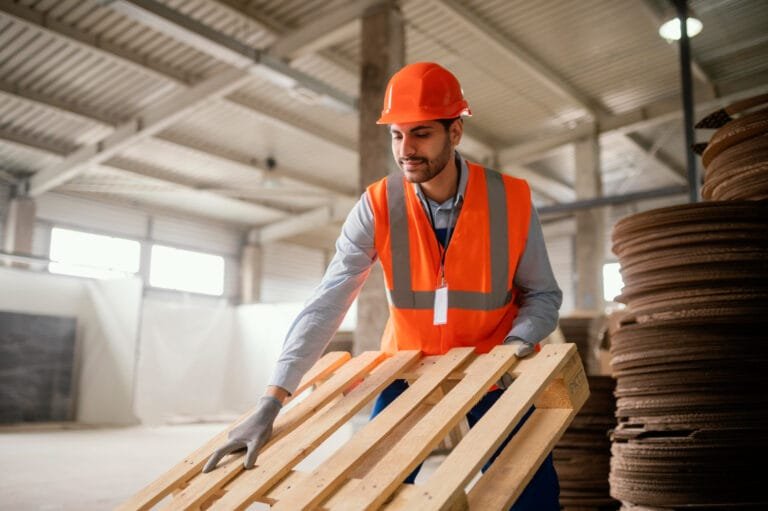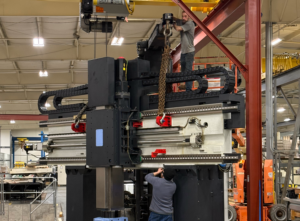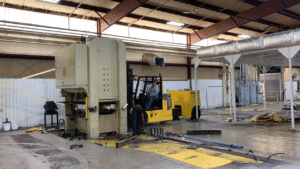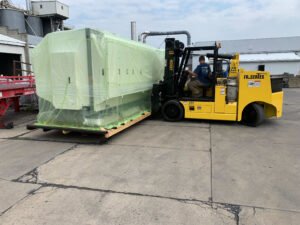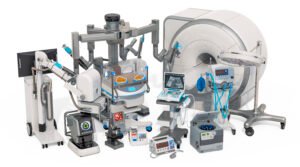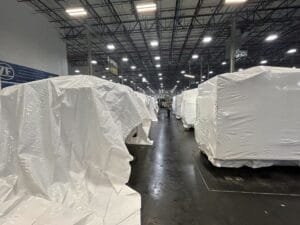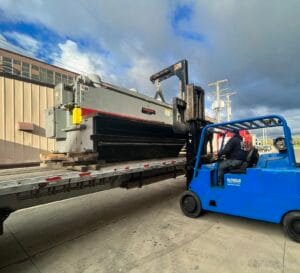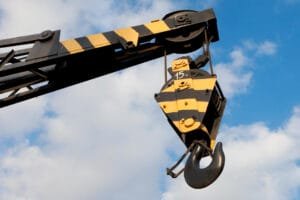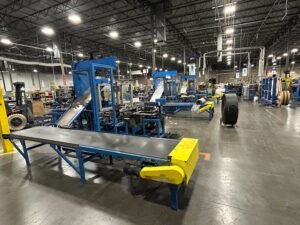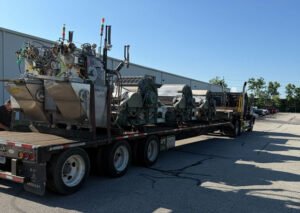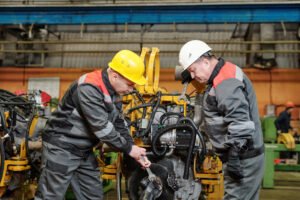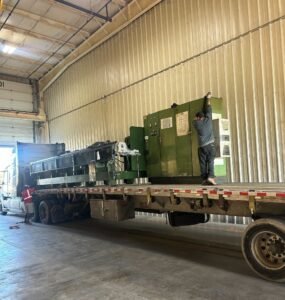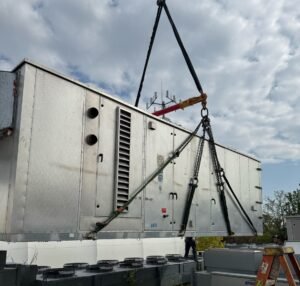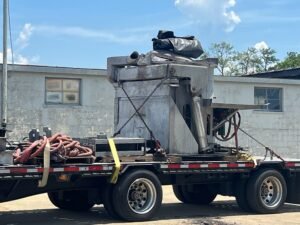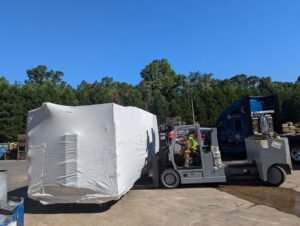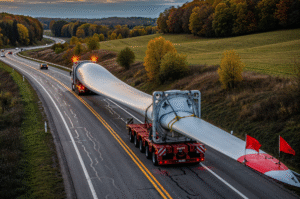When dealing with large-scale machinery, proper handling and transportation are critical to avoid damage, ensure safety, and minimize operational downtime. Industrial crating plays a vital role in the protection and secure transport of heavy equipment, ensuring that machines arrive at their destinations in optimal condition. From construction machinery to factory components, the protection offered by custom industrial crating can be the difference between a successful project and a costly failure. In this article, we will explore the importance of industrial crating, the different types of crates available, the benefits of customized crating solutions, and best practices for securing large-scale machinery.
What is Industrial Crating?
Industrial crating involves the design and construction of sturdy, protective enclosures specifically designed to house and safeguard machinery, equipment, or other large items during shipping, storage, or transport. Unlike standard packaging materials, industrial crates are built to handle substantial weight and protect against environmental factors such as moisture, vibrations, and impacts. These crates are typically made of high-quality materials like wood, metal, or composite materials to ensure that even the heaviest and most sensitive equipment remains intact throughout the journey.
Importance of Industrial Crating
Industrial crating is essential for several reasons. First, large-scale machinery is often expensive and sensitive to external impacts, making adequate protection crucial to avoid damage. Crating prevents machinery from moving or shifting during transport, reducing the risk of structural or mechanical damage. Second, industrial crates offer protection against environmental hazards such as water, dust, and extreme temperatures, which can affect machinery components and cause malfunctions. Third, custom crating solutions are tailored to the dimensions and specific needs of the equipment, ensuring a snug fit and minimizing any movement during shipping.
Types of Industrial Crates
Industrial crates are available in several types, each designed to serve a specific purpose. Choosing the right crate depends on the type of machinery being transported, the distance it will travel, and the environmental conditions it will encounter. Here are some of the most common types of industrial crates:
- Open Slat Crates: Open slat crates are constructed using wooden slats with spaces between them. They provide adequate support and protection for heavy machinery without adding unnecessary weight. These crates are typically used for large, durable machines that don’t require full enclosure but need to be kept in place during transport.
- Closed Wooden Crates: Closed wooden crates are the most common type of industrial crate. They are made from solid wood and provide full enclosure and protection for sensitive machinery. Closed crates shield equipment from external elements such as moisture, dust, and dirt, making them ideal for long-distance transport and storage in harsh environments.
- Reusable Crates: Reusable crates are designed to be used multiple times, making them a sustainable option for companies that frequently transport machinery. These crates are often built with robust materials and reinforced corners to withstand repeated handling. Reusable crates can be customized to accommodate a wide range of equipment sizes and shapes.
- Metal Crates: Metal crates are heavy-duty options for transporting particularly sensitive or valuable machinery. These crates offer superior protection against impacts, moisture, and other environmental factors. Metal crates are often used for aerospace, military, or other specialized applications where the utmost protection is required.
- Pallet Crates: Pallet crates are designed to be easily moved using forklifts or pallet jacks. They are typically used for smaller machinery or parts that need to be transported quickly and efficiently. Pallet crates are often combined with other packaging materials like foam or cushioning to protect delicate components during transit.
Customization of Industrial Crates
While standard crates can be effective for many applications, custom crates offer the best protection for large-scale machinery. Custom crating ensures that the size, shape, and specific requirements of the equipment are considered, offering a higher level of security and protection.
Tailored Fit
Custom crates are built specifically to match the dimensions of the machinery being shipped. This ensures a snug fit, which reduces movement during transit and prevents damage. A tailored fit is particularly important for machinery with irregular shapes or sensitive components.
Material Selection
Custom crates allow for the selection of materials based on the needs of the equipment and the conditions it will face. For example, machines that will be exposed to moisture may require a crate made of moisture-resistant wood or metal, while delicate equipment may benefit from additional foam padding or shock-absorbent materials.
Additional Protection Features
Customized crates can include features like shock absorption, vibration dampening, and even climate control options to protect highly sensitive equipment. These features are crucial for machinery that may be affected by changes in temperature or humidity.
Benefits of Industrial Crating
Investing in high-quality industrial crating solutions provides numerous benefits for companies involved in manufacturing, construction, or any industry that relies on large-scale machinery.
Damage Prevention
The primary benefit of industrial crating is the protection it offers against damage during transport. Crates help secure the equipment and prevent it from shifting or being exposed to harmful external elements like moisture, dirt, or debris. Proper crating reduces the risk of costly repairs or replacement of machinery.
Cost Efficiency
While industrial crating involves an upfront cost, it can save companies money in the long run by preventing damage to expensive equipment. By protecting machinery from damage, companies can avoid repair costs, delays in project timelines, and the expenses associated with downtime.
Compliance with Regulations
In many industries, there are strict regulations governing the transport and handling of heavy machinery. Custom crating ensures that equipment is packaged in compliance with these regulations, avoiding fines or delays due to non-compliance.
Versatility
Custom crating solutions can be tailored to a wide range of machinery and equipment, making them versatile for different industries. Whether a company is shipping heavy construction equipment, delicate electronic components, or manufacturing tools, custom crates can be designed to meet specific needs.
Environmental Protection
For companies concerned with sustainability, reusable crates are an excellent option. These crates can be used multiple times, reducing waste and promoting more environmentally friendly business practices. Additionally, crates made from recyclable materials help minimize the environmental impact.
Best Practices for Securing Large-Scale Machinery
Proper crating is just one aspect of protecting large-scale machinery during transport. Ensuring that equipment arrives safely also involves following best practices for securing and handling the machinery.
Proper Weight Distribution
When crating large machinery, it’s essential to ensure that the weight is evenly distributed within the crate. Uneven weight distribution can lead to tipping or shifting during transport, increasing the risk of damage. Engineers and packaging experts should evaluate the equipment and determine the best way to position it within the crate to achieve balance.
Securing Moving Parts
Many types of machinery have moving parts that can shift during transport, causing damage to the equipment or other components within the crate. It’s important to secure any moving parts, such as gears, arms, or levers, using restraints or padding to keep them from shifting.
Vibration and Shock Absorption
Large machinery can be sensitive to vibrations or shocks, especially when transported over long distances. Crates should be designed with vibration dampening materials or shock-absorbent features to protect the equipment. This is particularly important for delicate machinery or equipment with electronic components.
Moisture Protection
For machinery that will be exposed to moisture during transport, it’s essential to use moisture-resistant materials in the crating process. Adding desiccants or moisture-absorbing packets inside the crate can help prevent condensation from forming and protect sensitive parts from corrosion.
Proper Labeling
Crates should be properly labeled with information about the equipment inside, including weight, dimensions, and handling instructions. Labeling the crate with warnings about fragile or sensitive components can help ensure that it is handled carefully during transport.
The Role of Professional Crating Services
While it may be tempting for companies to build their own crates, professional crating services offer several advantages. Experienced crating companies have the expertise and equipment needed to design and build crates that meet industry standards and protect machinery from a wide range of hazards.
Expert Design
Professional crating services can evaluate the machinery and determine the best way to crate it for transport. This includes selecting the right materials, ensuring proper weight distribution, and designing custom features like shock absorption or climate control.
Compliance with Industry Standards
Many industries have specific regulations regarding the packaging and transport of large-scale machinery. Professional crating companies are familiar with these standards and can ensure that the crates meet all necessary regulations, preventing delays or fines.
Efficient Production
Building custom crates in-house can be time-consuming and may require specialized tools and materials. Professional crating companies have the resources and experience to produce high-quality crates quickly and efficiently, helping companies meet tight deadlines.
Common Industries That Use Industrial Crating
Industrial crating is used across a wide range of industries that rely on heavy equipment or sensitive machinery. Some of the most common industries that utilize industrial crating include:
- Manufacturing
Manufacturing companies often need to transport large machinery and components between factories or to customer locations. Industrial crating ensures that these items are protected during transport, reducing the risk of damage and downtime. - Construction
The construction industry frequently requires the transport of heavy equipment like cranes, bulldozers, and excavators. Industrial crating helps ensure that this equipment arrives at construction sites safely and is ready for use - Aerospace
The aerospace industry relies on precise, delicate equipment that must be handled with care. Industrial crating solutions for aerospace applications often include shock absorption, vibration dampening, and climate control to protect sensitive components. - Oil and Gas
In the oil and gas industry, heavy machinery and equipment are often transported to remote locations with harsh environmental conditions. Industrial crating provides the protection needed to ensure that this equipment arrives intact and ready for use. - Military and Defense
Military and defense organizations often transport specialized equipment that requires extra protection. Industrial crating ensures that this equipment remains secure during transport and is ready for deployment when it reaches its destination.
Conclusion
Industrial crating is a critical component of transporting large-scale machinery safely and efficiently. By investing in custom crating solutions, companies can ensure that their equipment is protected from damage, environmental hazards, and compliance issues. Whether it’s a piece of construction equipment or delicate aerospace machinery, proper crating helps ensure that it arrives at its destination in optimal condition, reducing downtime and preventing costly repairs.
For companies seeking reliable and professional industrial crating services, Alltracon stands out as one of the best providers in the industry. With a commitment to quality, expertise, and customer satisfaction, Alltracon offers customized crating solutions that meet the unique needs of each client, ensuring that machinery is transported securely and efficiently.
